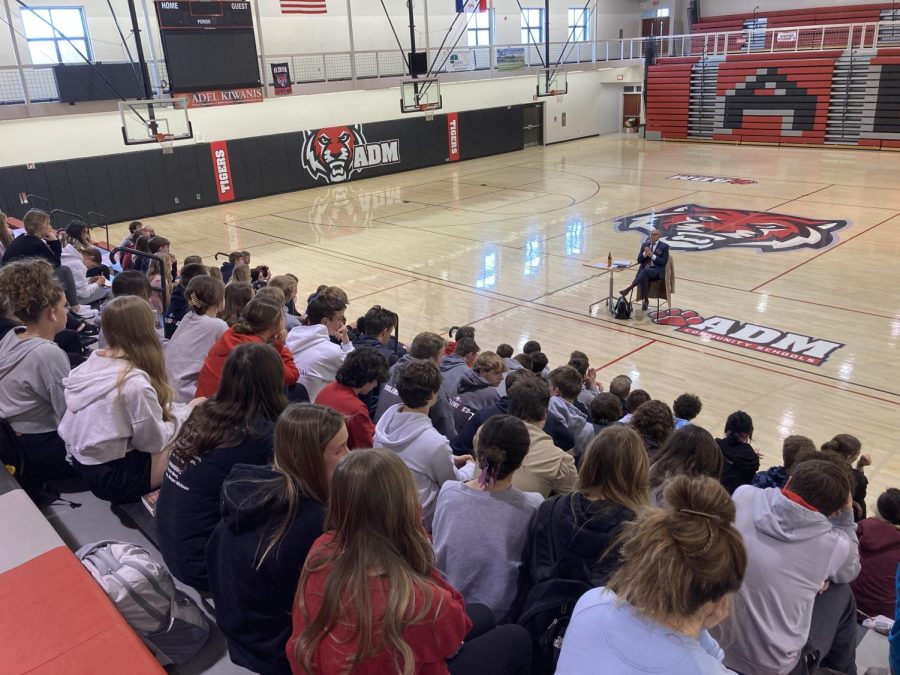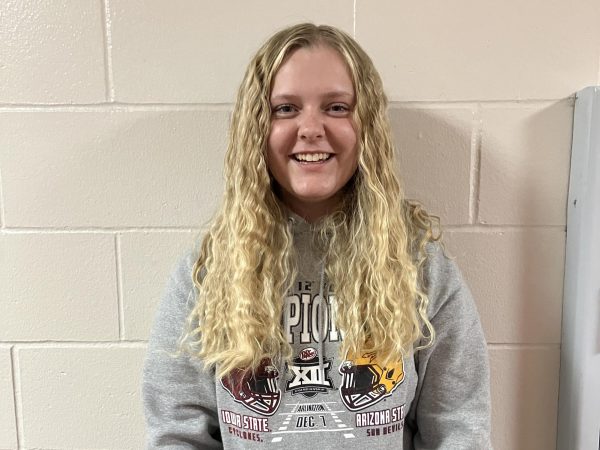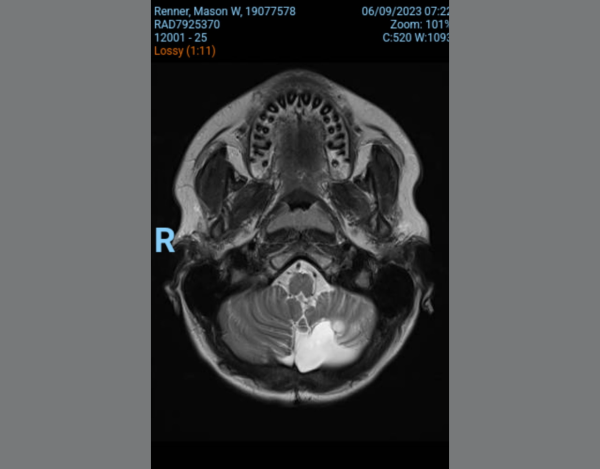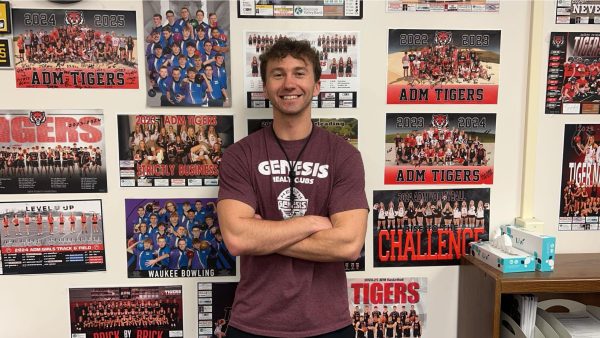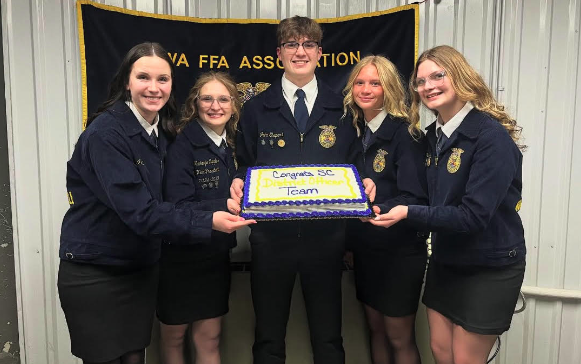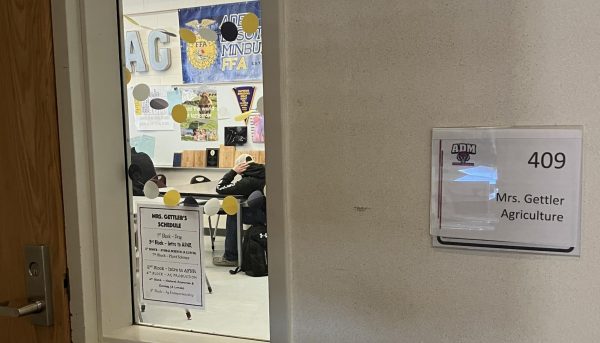Iowa Supreme Court Justice Visits the High School
During Power Hour, high schoolers listen as Justice McDonald talks with them as part of the Iowa Supreme Court’s outreach. The students in attendance included but were not limited to those in AP social studies classes. The students asked enough questions to push the session to almost an hour, out of Power Hour and into 8th hour.
It is not every day that an Iowa Supreme Court Justice visits your school. On Tuesday, April 4th, ADM High School hosted Justice Christopher McDonald for a Q and A session for students. If you were interested in learning about the Iowa Supreme Court but were unable to go, here is some of what the students learned, along with a little more.
The visit was just the beginning of a day that is part of the court going on the road. Throughout the year, Iowa’s seven Supreme Court Justices leave their Iowa Judicial Branch Building in Des Moines to travel to communities around Iowa, each justice talking with a different school and then coming together to hold court cases. That night the justices went to Perry for oral arguments.
In Adel, Justice McDonald began his time with the students by describing a monumental historic court case in Iowa. Alexander Clark, who was black, wanted his daughter to attend a white-only school and the case went to the Iowa Supreme Court. In 1868, the Iowa Supreme Court decided segregation in schools was unconstitutional in Iowa ahead of the United States Supreme Court. McDonald wanted students to understand the impact courts can make with their decisions by sharing this important and influential case that took place in Iowa.
“The state Supreme Court is an incredibly powerful and important organization that our court, in particular in Iowa, has a long history of being innovative and courageous on civil rights issues involving race, and sex, and gender throughout the course of its history, and I think that students should be proud of that,” McDonald said in an interview after the Q and A session.
Going to schools is an opportunity for the court to share what it is like being a judge while hearing from the communities. McDonald said they act as a “bridge,” when they get to “talk to young people and explain really from a civics perspective what it is we do on a day-to-day basis and how that may impact you and your life.” As a judge, McDonald said, “It’s important for me to go talk to people in the community to see what’s on people’s minds… It’s educational for me and it’s educational for students.” In this position, McDonald has been able to travel to many other states for cases and to speak at conferences as well.
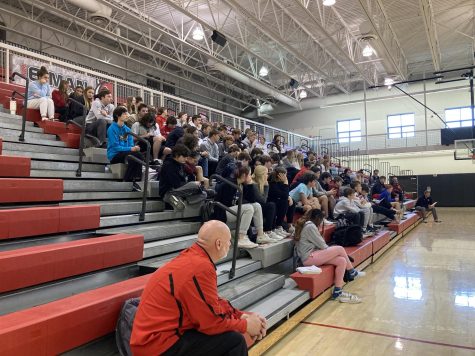
The questions posed by students ranged from lighthearted and fun to thoughtful and complex. They learned McDonald’s favorite color (blue) and what types of podcasts he listens to (law, among others), and at the same time, they learned about the transition from a lawyer to a judge, what a typical day in the life of a judge looks like, and what he thought could improve the justice system. He was also asked who an inspirational person in his life is (his mentor, David Hansen), a memorable case he had (his very first case as a District Court Judge), and if he has free time (yes, but his job is demanding).
Through all of these questions and more, McDonald touched on many aspects of a judge’s experience, including what it takes to become a judge. The Iowa Supreme Court Justices are appointed by the governor after a panel looks at the applicants. McDonald described how private practice focuses an attorney’s experience into a specialty, but as a judge, he has to have a general knowledge of all types of law.
September to June is the court term when the court hears oral arguments, McDonald said, and in the summer the justices work on administrative work and lawyer disciplinary cases related to their job of managing the Judicial Branch of government. During their term, the justices hear about 25 cases each month. After researching and hearing a case, the justices meet to discuss and decide it and assign it to a justice to write up the result, which then gets shared with and revised by the other justices.
McDonald said Iowa has a good court system, but the problems McDonald thinks are the most pressing in today’s justice system include how much it costs to hire a private attorney, the lack of lawyers in divorce and child custody cases, and the shortage of criminal defense lawyers. “[It’s] a huge, huge problem, to have lawyers that are so incredibly expensive that the average person can’t afford a lawyer,” said McDonald.
Additionally, without lawyers in domestic cases, he said a judge’s job is harder when people represent themselves. Lawyers know court procedures, how to present the arguments, and they help keep the cases impartial. The deficiency of criminal defense lawyers is also a problem because young lawyers right out of law school want to go into the higher profiting private practices to be able to pay off their large student loans rather than become government employees. McDonald personally believes making it easier to become a lawyer, since after undergraduate and graduate school becoming a lawyer rides solely on the passing of the bar exam, would help solve these problems. He said apprenticeships could be a way for people to get the experience and practice they need in order to get licensed.
When a student asked how McDonald stays objective when deciding cases, McDonald said the justices take an oath and it is the nature of the job to be neutral and open-minded, but it does take training and can be difficult. It is also beneficial that there are seven people each taking an independent look at the cases before a verdict is made, and some cases are trial by jury.
“I think the art of this job is really not the speaking and the writing, it’s really the listening and paying attention to what people are saying.” -Justice McDonald
He believes this job has made him a better listener and said, “Ironically, I’ve become less judgemental even though my job is deciding cases.” As a judge he sees people on their worst days, McDonald said, “And I think it really teaches you to, kind of, have grace for people and understand that people make mistakes and that they do have to be held accountable for their mistakes. They have to own it and be responsible, but at the same time, you know, they can make amends, they can get a fresh start… that’s really kind of broadened my horizon… there are a lot of people who are facing real problems and we [justices] have to deal with those on a daily basis.”
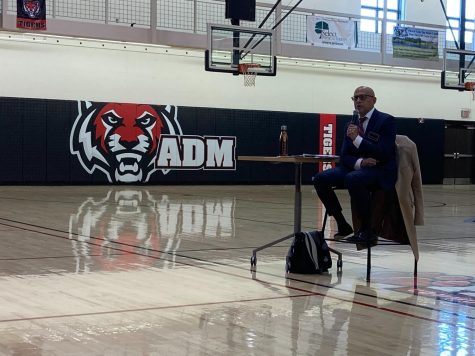
Although being a court justice requires making hard decisions knowing what the results might be, and all while remaining objective, McDonald said it is a rewarding job.
“I really, really love this job,” he said, “I like all parts of it,” from “being part of the government, administering justice, speaking about the court system and what we do and why that’s so important,” to “the research and the writing, spending time with my law clerks, and that kind of stuff.”
The opportunities he gets to serve the public by “meeting people [and] resolving their cases” is also important to him and led him into this position. McDonald was an attorney in private practice before becoming a District Court Judge, a judge on the Court of Appeals, and then an Iowa Supreme Court Justice.
The service McDonald could see himself doing by becoming a judge appealed to him. “So for me, it was just a decision of when I had decided that I had kind of done everything I wanted to do in private practice,” he said.
The job is not without its challenges, though. “The most challenging part is really wrapping your mind around really hard cases and trying to come out with a result that fairly and impartially applies the law, and also that makes sense, kind of in the day-to-day part of everybody’s lives,” said McDonald. When the law is not clear, he said the justices have to rely on similar cases and results of public policies, and they look to other states, though it is sometimes conflicting.
For McDonald, a restraint being a judge has brought is the inability to fundraise or help with non-profit and community development organizations and projects because of the conflicts of interest that those activities could create. However, that does not stop McDonald from feeling passionate about his local community as a Des Moines native. Other passions of his include law and justice in Iowa and nationally.
He hopes that students and the community “understand that courts are not political institutions… we really are applying the law as it is and leaving it to the other branches of government to make policy decisions.” This distance from politics is intentionally an Iowa requirement for its justices. McDonald said they are allowed to vote in general elections with secret ballots, but their political parties are not public knowledge, and they cannot go to caucuses or publicly support political candidates.
McDonald majored in art in college and was considering becoming a teacher, but ultimately chose to go to law school and become a lawyer. So whether or not the career path the students choose is in the justice system, McDonald told them, “You matter,” and that they can make a difference in the world.



